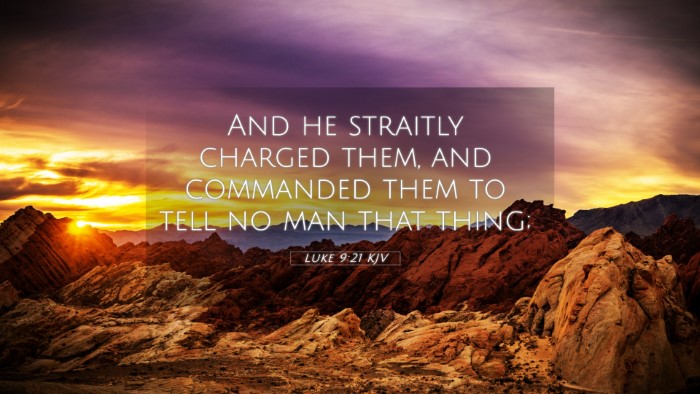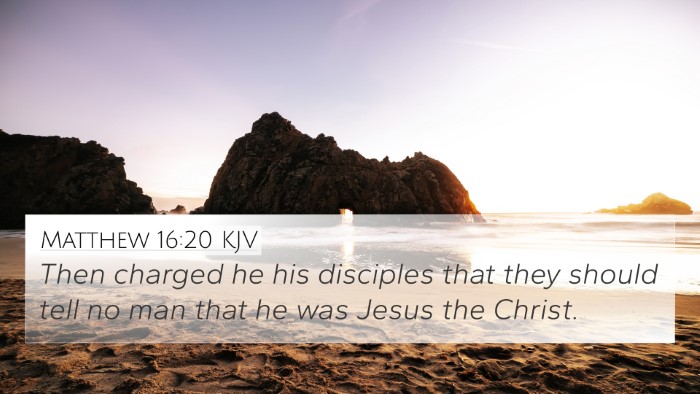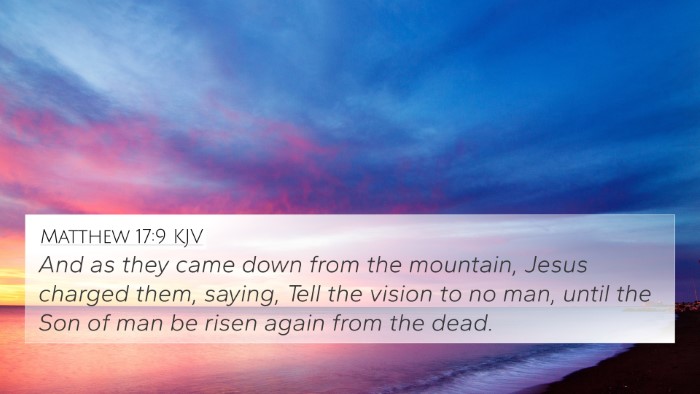Understanding Luke 9:21
In this passage, Jesus sternly commands His disciples not to reveal His true identity as the Christ. This verse highlights a critical turning point in the Gospel narrative, marking a shift in Jesus' ministry from public teaching to the more intimate preparation of His disciples for the impending suffering and death He would endure.
Matthew Henry's Commentary Insights
Matthew Henry elaborates on the significance of Jesus' directive by emphasizing the importance of timing in His revelation as the Messiah. He notes that Christ wished to avoid the premature recognition and misconception of His mission. By instructing His disciples to keep silent about His identity, Jesus aimed to steer away from any potential political or militant expectations of a Messiah. This restraint demonstrates His commitment to fulfilling the prophecies regarding His suffering and sacrifice.
Albert Barnes’ Commentary Analysis
Albert Barnes provides further context by explaining that this command was part of a broader preparation for the disciples. He suggests that the understanding of Christ's true nature needs to develop fully within the disciples before they could appropriately proclaim His identity. Barnes draws attention to the messianic secret, a theme prevalent in the Gospels, wherein Jesus was not yet ready for full public acknowledgment and acceptance. This contributes to an understanding of the deeper implications of faith and revelation in the life of a follower of Christ.
Adam Clarke’s Exegesis
According to Adam Clarke, this verse reflects a critical theological tenet about the nature of Christ's mission. His silence regarding His identity served a purpose, as it was intended to focus on the fulfillment of God’s plan rather than the desires of people. Clarke remarks on the disciples' mixed understanding and their gradual enlightenment throughout the Gospel narrative. He correlates this passage with the overall theme of Jesus preparing His followers for their eventual trust and faith in Him as the Christ, leading them toward a deeper spiritual comprehension.
Key Themes and Cross-References
- Messianic Secret: This refers to the theme of Jesus withholding His identity until the appropriate time. Other biblical references include Mark 1:34 and Matthew 16:20.
- Preparation of the Disciples: Jesus frequently prepared His followers for challenges and truths regarding His mission, as seen in Luke 12:11-12.
- Role of Suffering: This is a central theme in understanding Christ's mission as referenced in Luke 24:26 and Isaiah 53:5.
- Authority of Jesus: Acknowledging Jesus’ authority before understanding His role as a suffering servant can be cross-referenced with Matthew 28:18-20.
- Disciples' Gradual Understanding: The increasing awareness of the disciples can be connected to John 20:9 and Luke 24:45.
- Divine Timing: The significance of God's timing in revelation is highlighted in Galatians 4:4.
- Jesus as the Fulfillment of Scripture: Jesus consistently fulfills Old Testament prophecies about the Messiah, as noted in Matthew 5:17.
- Importance of Faith: This theme of faith is crucial to understanding discipleship, as highlighted in Hebrews 11:1.
- Call to Discipleship: The invitation to follow Jesus carries a significant cost, echoed in Luke 14:27.
- Revelation of Jesus Christ: Understanding who Jesus is should always lead to a transformative revelation, as noted in 1 John 5:20.
Conclusion
In summary, Luke 9:21 serves as a pivotal moment within the Gospel, not only indicating Jesus’ intent for His disciples but also encapsulating significant theological themes. The connection between this verse and others creates a richer understanding of biblical narratives and Christ's identity. Through cross-referencing scriptural texts, one can uncover deeper meanings and thematic ties, enhancing the study of the Bible and drawing believers into a more profound engagement with their faith.





